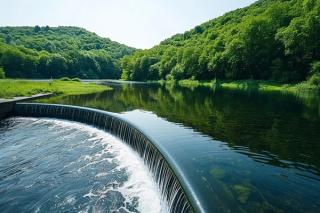
The Journey to Nature Positive: Integrating Freshwater Ecological Solutions in Infrastructure.
by Dr. Ben Cook, Eoin Noble
View post

This is the second article in our The Journey to Nature Positive series, where our experts illustrate how Nature-based Solutions (NbS) can tackle societal challenges, offer additional benefits over engineered solutions, and promote a Nature-positive world. For a refresher on what we mean by Nature-based Solutions; our first article of the series is available to view here.
Today, we are exploring Natural Capital of Freshwater Ecosystems and the benefits nature-positive aquatic ecological solutions can bring to your projects.
The importance of the environment for global economic productivity and societal wellbeing is increasingly being recognised, as are the economic and social benefits of enhancing natural capital at the business and project scales. This was recently recognised through the World Economic Forum 2025 Global Risks Report (1), with biodiversity loss and extreme weather events found to be the greatest long-term threat to the global economy.
With respect to freshwater ecology, natural capital includes but is not limited to:
Although it is often understood that businesses depend on water for their daily operations, the impact on aquatic ecosystems through groundwater depletion, inadvertent pollution and surface water diversion is often overlooked. Incorporating aquatic NbS through the life cycle of infrastructure projects is becoming increasingly more integral for demonstrating a project’s solid environmental stewardship principles, and provides ancillary benefits such as social license to operate and enhanced operating conditions.
SLR has extensive experience in designing and advising on NbS at both the planning scheme and major project scales. This includes the implementation of freshwater ecology solutions such as:
Naturalisation of formally channelised (concrete-lined or piped) waterways, and ecological rehabilitation of historically impacted wetlands are significant nature-positive solutions for aquatic ecology receptors.
NbS can enhance the resilience of vulnerable areas by restoring or creating natural infrastructure, such as riparian vegetation, which provide nutrient and sediment regulation functions and support biodiversity. The resulting socio-economic benefits include job creation, recreation, mental health wellness and sustainable livelihoods.
NbS provide a significant opportunity to accelerate sustainable approaches to addressing climate change.
Delivering on this ambition will require specialists (including aquatic ecologists, hydrologists, hydrogeologists, engineers, soil scientists, economists, social scientists, and climate scientists) collaborating to plan, design and implement schemes that work and integrate with primary project outcomes.
Our industry leading specialists offer comprehensive aquatic environmental, ecology, and biodiversity services globally. They can support your organisation with governance and strategy advice, as well as operational project support to incorporate NbS at all stages of infrastructure developments.
To speak with one of our specialists, contact Dr. Ben Cook or Eoin Noble today.
Catch up on the below articles to learn more about the support and solutions our specialists are providing in aquatic environments.
Our next article in the series will focus on how Carbon Capture, NbS and Biodiversity can work together to meet net-zero targets.
World Economic Forum 2025. Global Risks Report 2025. Available at: https://reports.weforum.org/docs/WEF_Global_Risks_Report_2025.pdf
Vicarelli M, Sudmeier-Rieux K, Alsadadi A, Shrestha A, Schütze S, Kang M, Leue M, Wasielewski D, Mysiak J. On the cost-effectiveness of Nature-based Solutions for reducing disaster risk. Science of The Total Environment. 2024 Jul 6:174524.
Vujcic M, Tomicevic-Dubljevic J, Grbic M, Lecic-Tosevski D, Vukovic O, Toskovic O. Nature based solution for improving mental health and well-being in urban areas. Environmental research. 2017 Oct 1;158:385-92.